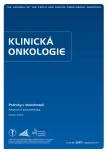Immunotherapy for Bladder Cancer
Authors:
T. Büchler
Authors‘ workplace:
Onkologická klinika 1. LF UK a Thomayerovy nemocnice, Praha
Published in:
Klin Onkol 2017; 30(Supplementum3): 6-9
Category:
Review
doi:
https://doi.org/10.14735/amko20173S6
Overview
Urothelial carcinoma is the most common urological malignancy. Nonspecific immunotherapy using the Bacillus Calmette-Guerin vaccine has long been the mainstay for the treatment of high-risk superficial bladder carcinoma in an adjuvant setting after transurethral endoscopic resection. In metastatic disease, cisplatin-based chemotherapy remains the main therapeutic modality. In Europe, the standard second-line chemotherapy for patients with cisplatin-refractory tumours is vinflunine. Other systemic treatments with a lower level of evidence include paclitaxel and docetaxel. Studies of tumour microenvironment indicate a significant role for the immune system in the pathogenesis of urothelial tumours and the presence of a CD8 lymphocyte infiltrate is associated with better survival. In urothelial tumours, the correlation between PD-L1 expression in the tumour and the response to PD-1/PD-L1 inhibitors has been repeatedly demonstrated in clinical studies. Several inhibitors of PD-1/PD-L1 pathway are undergoing advanced-phase clinical trials and atezolizumab, nivolumab, pembrolizumab, durvalumab, and avelumab have already have received permanent or temporary registration status in the United States, mostly as second-line treatments for patients progressing on cisplatin-based chemotherapy. Three of these agents are currently registered in Europe: nivolumab for second line treatment and atezolizumab and pembrolizumab for first line treatment in patients not eligible for cisplatin as well as and for second line treatment. These novel immunotherapeutic agents for bladder cancer are relatively well tolerated and therefore potentially useful for patients with contraindications or intolerance to platinum regimens. The main toxicities include asthenia/fatigue, lymphopenia, anaemia, musculoskeletal pain, decreased appetite, and nausea.
Key words:
bladder cancer – imunotherapy – PD-1 receptor – antibodies – monoclonal
This work was supported by the Czech Ministry of Health CR – RVO Thomayer Hospital – TN 0064190.
The author declare he has no potential conflicts of interest concerning drugs, products, or services used in the study.
The Editorial Board declares that the manuscript met the ICMJE recommendation for biomedical papers.
Submitted:
29. 8. 2017
Accepted:
3. 10. 2017
Sources
1. Dušek L, Mužík J, Kubásek M et al. Epidemiologie zhoubných nádorů v České republice. Masarykova univerzita [online]. Dostupné na: http: //www.svod.cz.
2. Sharma P, Shen Y, Wen S et al. CD8 tumor-infiltrating lymphocytes are predictive of survival in muscle-invasive urothelial carcinoma. Proc Natl Acad Sci U S A 2007; 104 (10): 3967–3972. doi: 10.1073/pnas.0611618104.
3. Patard J, Moudouni S, Saint F et al. Tumor progression and survival in patients with T1G3 bladder tumors: multicentric retrospective study comparing 94 patients treated during 17 years. Urology 2001; 58 (4): 551–556. doi: 10.1016/S0090-4295 (01) 01324-3.
4. Lamm DL, Blumenstein BA, Crawford ED et al. A randomized trial of intravesical doxorubicin and immunotherapy with bacille Calmette-Guérin for transitional-cell carcinoma of the bladder. N Engl J Med 1991; 325 (17): 1205–1209. doi: 10.1056/NEJM199110243251 703.
5. National Cancer Institute [online]. FDA Approves Immunotherapy Drugs for Patients with Bladder Cancer [online]. Available from: https: //www.cancer.gov/news-events/cancer-currents-blog/2017/approvals-fda-checkpoint-bladder.
6. Powles T, Eder JP, Fine GD et al. MPDL3280A (anti-PD-L1) treatment leads to clinical activity in metastatic bladder cancer. Nature 2014; 515 (7528): 558–562. doi: 10.1038/nature13904.
7. Rosenberg JE, Hoffman-Censits J, Powles T et al. Atezolizumab in patients with locally advanced and metastatic urothelial carcinoma who have progressed following treatment with platinum-based chemotherapy: a single-arm, multicentre, phase 2 trial. Lancet 2016; 387 (10031): 1909–1920. doi: 10.1016/S0140-6736 (16) 00 561-4.
8. Galsky MD, Retz M, Siefker-Radtke AO et al. Efficacy and safety of nivolumab monotherapy in patients with metastatic urothelial cancer (mUC) who have received prior treatment: Results from the phase II CheckMate 275 study. Ann Oncol 2016; 27 (Suppl 6): abstr LBA31 PR. doi: 10.1093/annonc/mdw435.24.
9. Plimack ER, Bellmunt J, Gupta S et al. Safety and activity of pembrolizumab in patients with locally advanced or metastatic urothelial cancer (KEYNOTE-012): a non-randomised, open-label, phase 1b study. Lancet Oncol 2017; 18 (2): 212–220. doi: 10.1016/S1470-2045 (17) 30007-4.
10. O‘Donnell PH, Grivas P, Vasant Balar AV et al. Biomarker findings and mature clinical results from KEYNOTE-052: First-line pembrolizumab (pembro) in cisplatin-ineligible advanced urothelial cancer (UC). J Clin Oncol 2017; 35 (Suppl): abstr. 4502.
11. Bellmunt J, de Wit R, Vaughn DJ et al. Pembrolizumab as Second-Line Therapy for Advanced Urothelial Carcinoma. N Engl J Med 2017; 376 (11): 1015–1026. doi: 10.1056/NEJMoa1613683.
12. Massard C, Gordon MS, Sharma S et al. Safety and Efficacy of Durvalumab (MEDI4736), an Anti-Programmed Cell Death Ligand-1 Immune Checkpoint Inhibitor, in Patients With Advanced Urothelial Bladder Cancer. J Clin Oncol 2016; 34 (26): 3119–3125. doi: 10.1200/JCO.2016.67.9761.
13. Bellmunt J, Powles T, Vogelzang NJ. A review on the evolution of PD-1/PD-L1 immunotherapy for bladder cancer: The future is now. Cancer Treat Rev 2017; 54 : 58–67. doi: 10.1016/j.ctrv.2017.01.007.
Labels
Paediatric clinical oncology Surgery Clinical oncologyArticle was published in
Clinical Oncology

2017 Issue Supplementum3
- Possibilities of Using Metamizole in the Treatment of Acute Primary Headaches
- Metamizole at a Glance and in Practice – Effective Non-Opioid Analgesic for All Ages
- Metamizole vs. Tramadol in Postoperative Analgesia
- Spasmolytic Effect of Metamizole
- Safety and Tolerance of Metamizole in Postoperative Analgesia in Children
-
All articles in this issue
- Immunotherapy for Bladder Cancer
- Evaluation of Inflammatory Cells (Tumor Infiltrating Lymphocytes) in Solid Tumors
- Imunoterapie v léčbě karcinomu plic
- Comparison of RECIST 1.1 and iRECIST for Response Evaluation in Solid Tumours
- Advances in Immunotherapy of Malignant Melanoma
- Combined Regimens in Immunotherapy
- Checkpoint Inhibitors in the Treatment of Upper Gastrointestinal Tract Tumors
- Immunotherapy of Renal Cell Carcinoma
- Immunotherapy of Colorectal and Anal Carcinoma
- Clinical Oncology
- Journal archive
- Current issue
- About the journal
Most read in this issue
- Evaluation of Inflammatory Cells (Tumor Infiltrating Lymphocytes) in Solid Tumors
- Comparison of RECIST 1.1 and iRECIST for Response Evaluation in Solid Tumours
- Immunotherapy of Colorectal and Anal Carcinoma
- Imunoterapie v léčbě karcinomu plic
